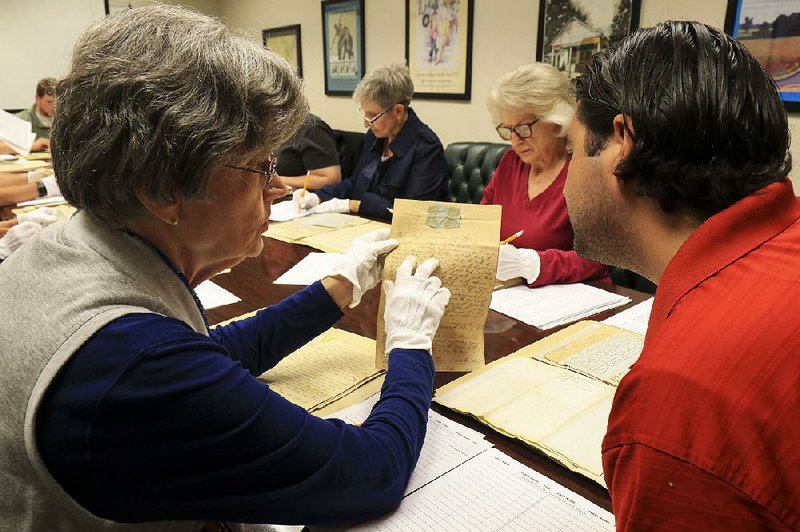The elaborate cursive writing was hard to decipher on the 1862 cotton paper.
Bill Adams leaned closer as he peered through his brass-handled magnifying glass, then began sounding out the four-letter name.
"O..." he trailed off, then leaned even closer. "K is next. It's definitely a K."
Adams, an archival volunteer, abruptly stopped, leaned back and looked at the other amateur conservationists surrounding the long conference table set up in the back room of the Arkansas State Archives' storage building.
"It's okra," he deadpanned. "The name is okra."
Laughter burst from the group.
"I've had a couple of those," said Susan Boyle, president of Friends of the Arkansas State Archives, a nonprofit organization that raises funds and awareness for the agency. "I thought it was a name and it turned out to be an item."
Since midsummer, every Tuesday from 9 a.m. to noon, a dozen or more volunteers file into the storage building, collect a legal-sized manila file from a cardboard box and take their seat at the table.
On this day, the numbered folders contained handwritten Hempstead County records from the early to mid-1800s that ranged from criminal trial transcripts to probate documents. The volunteers are tasked with skimming the records, word by word, to find names.
"You're going to see S.T. Sanders a lot," said Blake Gilliam, an archival assistant.
Simon T. Sanders -- who was born in North Carolina in 1796 and moved to Arkansas in the mid-1800s -- served as the Hempstead County clerk for about 30 years after he was elected in 1838. He was the postmaster of the town of Washington for many more years.
His light-handed and scrolling signature is repeated hundreds of times through the more than 10 cubic feet of records from the Hempstead County collection. The documents had been collected through the years and stored at various places before coming to rest at the Southwest Arkansas Regional Archives branch in Washington.
Wendy Richter, director of the State Archives, had the collection transported this summer to the Little Rock facility for the volunteer project.
Gilliam picked up a sheet from a pile of white forms in the center of the table. He pointed to the heading of the form with three columns -- Last Name, First Name, File -- on the left and three more on the right and about 25 rows. Each time a volunteer finds a name in the documents, it is recorded on the sheet with last name, then first name, followed by the file's number.
One file can produce numerous sheets of names. At the end of each week's volunteer session, State Archives teams enter the names in the database.
"We're getting close to being finished," Richter said. "We've done data entry for about 20,000 names from the Hempstead records."
The indexed names are added to the archives' database that is searchable for free online at archives.arkansas.gov/research/search-records.aspx
Genealogists or amateur researchers can enter a name and -- if the name is in there -- the archives will produce a list, detailing the file number and the storage location of each file. In addition to the Little Rock main office, the State Archives has two branches -- the Southwest Arkansas Regional Archives in Washington and the Northeast Arkansas Regional Archives in Powhatan in Lawrence County -- where historical files are maintained and can be viewed.
"The names will tie back to the files and will be easily retrievable when folks go down to the archive location," Richter said. "Any regular Joe can pull up these files."
The Arkansas State Archives, which is under the umbrella of the Department of Arkansas Heritage, was first created as the Arkansas History Commission by the state General Assembly in 1905. The department is responsible for collecting and preserving the state's official records and historic materials.
Richter, who took the helm of the archives in March after serving as the library archivist and a faculty member at Ouachita Baptist University in Arkadelphia, said the volunteer project provides an invaluable service to the state and frees up State Archives staff members to perform other tasks.
"It is especially important for the Hempstead County records because it served as a transportation artery for people moving to Texas," Richter said. "Folks may have only been there a year or two. This may be the only place someone can find the person they're searching for."
Stacy Hurst, director of the Department of Arkansas Heritage, said the program makes the records available to the public more quickly than if it was only the staff doing the indexing.
"Volunteers help Arkansas State Archives staff handle important documents that reveal the big picture of what life was like in Arkansas nearly 200 years ago," Hurst said. "The volunteer program is of great benefit because it helps us preserve and protect our state's heritage, history and culture."
Only eight people showed up at the first volunteer session in July, but Richter said the group grew quickly as word got out. There is no stereotypical volunteer, she said, with a wide range of ages and professions represented.
"It's just fun," Richter said. "It's a challenge to solve the mystery of the names and read the history. All of that is a lot of fun to me. I have the best job in the world."
Richter and her team debated the volunteers' next project. In the lead is the indexing of state land records that date back to the 1800s and documenting the first transfer of state lands into private hands.
"We'd better hurry up and decide," Richter said. "The volunteers are getting faster and faster every week."
SundayMonday on 11/18/2018
